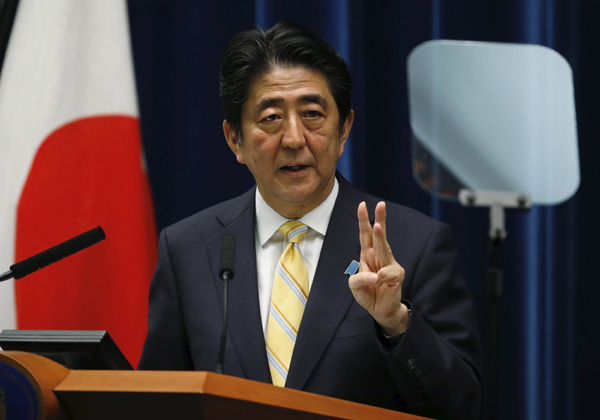China-Japan friendship based on people's exchanges
Updated: 2015-05-25 07:44
(China Daily)
|
|||||||||||
 |
|
Japan's Prime Minister Shinzo Abe gestures as he speaks during a news conference at his official residence in Tokyo May 14, 2015. [Photo/Agencies] |
President Xi Jinping's speech on people-to-people exchanges between China and Japan marks the latest effort by China to get Sino-Japanese ties back on the right track.
"The China-Japan friendship is rooted in the people, and the future of the bilateral relationship is in the hands of the people of the two countries," Xi told a gathering of more than 3,000 Japanese visitors in Beijing on Saturday.
History has proved that friendly relations between China and Japan benefit not only the two countries and the two peoples, but also Asia and the world at large, he added.
As close neighbors and important players in world and regional arenas, China and Japan have everything to gain from handing down their friendship from generation to generation.
Throughout the world, mutual understanding and favorable impressions between peoples form the basis of nation-to-nation relations. This is especially true of Sino-Japanese ties.
In recent years, as ties have plunged to their lowest point in years, public sentiment in each country toward the other country has become increasingly unfavorable. Last year, a survey jointly sponsored by China Daily and the Japanese nonprofit think tank Genron NPO found that public approval of bilateral ties in both countries had reached its lowest ebb in 10 years.
While some 93 percent of the Japanese polled confess they do not harbor good feelings toward China, calls to boycott Japanese products and an outburst of anti-Japan sentiment flare up in Internet chat rooms in China each time Japan moves to whitewash history or provoke China over the Diaoyu Islands disputes.
No doubt, enhancing people-to-people exchanges will help usher in a better environment for bilateral ties. It is good to see such exchanges have increased in recent months along with more official contacts between the two governments.
Yet, Japanese Prime Minister Shinzo Abe's constant denial of Japan's history still poses a major hindrance to deepening mutual understanding between the two peoples, especially since this year marks the 70th anniversary of the end of World War II.
As Xi rightfully pointed out in his speech, the crimes committed by the Japanese militarists during Japan's war of aggression should never be covered up. The Abe administration should take history as a mirror and show heart-felt repentance for the dark days in its history.
Only by so doing will a good momentum in people-to-people exchanges be sustained.
Related Stories
Abe still playing his games over history 2015-05-22 07:44
Abe's denial of Potsdam Proclamation no good for Japan's image 2015-05-21 16:00
Abe's cabinet to approve Japan security bills 2015-05-14 09:55
Abe's US visit jeopardizes regional peace, shadows ties with neighbors 2015-05-05 10:08
Today's Top News
Li: 'Great potential' for Sino-Colombian ties
Premier Li urges harnessing China's manufacturing prowess
Ukraine withdraws from 5 military accords with Russia
Cameron: Curbing EU migrant access to welfare red line in EU talk
China, heir to Mozart?
OPEC turn down Chinese requests for extra oil
Beijing concerned as US accuses 6 Chinese of economic spying
Ma backs female entrepreneurs
Hot Topics
Lunar probe , China growth forecasts, Emission rules get tougher, China seen through 'colored lens', International board,
Editor's Picks

|

|

|

|

|

|






